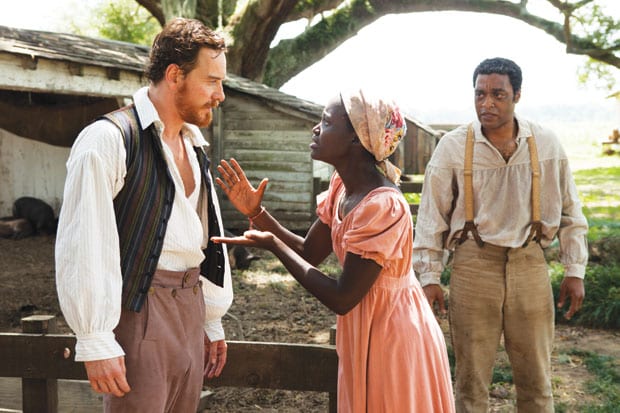I’m not naive about mankind’s capacity to exploit his fellow man, but the one precept of American slavery I could never wrap my mind around was the idea that one human being could possess, as property, another human being. It’s beyond comprehension. Possess? Control? Terrorize?
Dehumanize? Yes, I can get that. But own? It boggles the mind.
12 Years a Slave does not explain that conundrum, but it does accentuate its cruelty in a way no film in memory has ever attempted. Solomon Northup (Chiwetel Ejiofor, pictured right) was a “free man of a color” living legally above the Mason Dixon Line when, in 1841, he was kidnapped, transported to Louisiana and sold — sold! — into servitude. (He didn’t have his papers, of course, to prove he was free; similarities to photo ID and citizenship paper laws are very much intentional.) Solomon could read, write and play the violin. He was not the offshoot of a family that didn’t know from freedom; he had tasted it, lived it — which somehow makes his tragedy more profound, like Neo in The Matrix.
Director Steve McQueen, who has explored imprisonment of different kinds in the art-house films Hunger (an actual prison) and Shame (sexual addiction), and screenwriter John Ridley (adapting Northup’s actual memoir), wisely imbues 12 Years a Slave not with an unrelenting oppressiveness that borders on torture porn, but rather with a clear-eyed matter-of-factness that enhances the horror. (In one scene, where
Solomon, strung up so he dangles inches above the ground, McQueen simply turns on the camera for an uncomfortably long time, watching from a distance while he dances on his toes to avoid strangulation.)
Ejiofor is phenomenal, as is Michael Fassbender (pictured left) as the insane, lustful plantation owner. But everyone is doing top-notch work in the year’s most resonantly humane film of the year.
Now playing in wide release.
This article appeared in the Dallas Voice print edition October 25, 2013.


